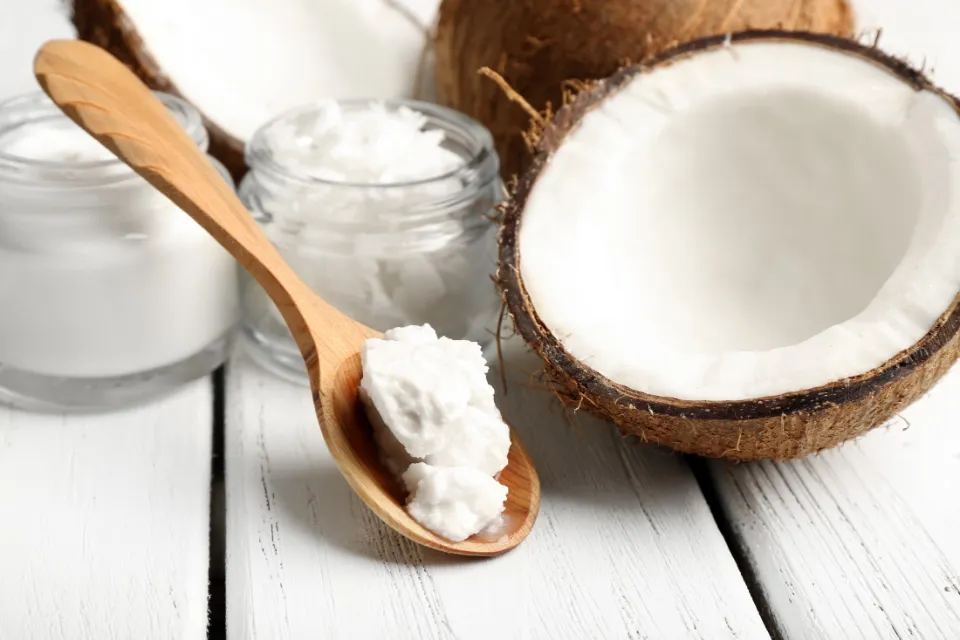Recently, does coconut oil whiten teeth has become a frequently asked question. So what is the answer?
It’s crucial to keep up a good oral hygiene routine with tried-and-true methods, like consistent brushing and flossing. While remember: coconut oil pulling is not a suitable substitute for this, and it certainly won’t help whiten your teeth.
Read on to learn more about the effects of coconut oil on teeth.
History of Coconut Oil in Teeth Whitening
The use of coconut oil in teeth whitening dentists dates as far back as the origin of oil pulling about 2,500 years ago in orthodox medicine in India. Oil pulling is based on the idea of Ayurveda, which uses oil to lubricate all of the body’s tissues.
According to some studies, oil pulling might have advantages. People who practice oil pulling typically swish coconut oil around in their mouths for 20 minutes.

Some people, however, can swish oil in their mouths for only about 5 minutes before feeling sick to their stomach. The advantages for dental health include anti-microbial and anti-inflammatory properties.
Typically, between a tablespoon and a teaspoon of oil is used for oral oil pulling. It is also possible to use less oil pulling than what is advised.
Does Coconut Oil Whiten Teeth?
Let’s first examine the potential benefits of oil pulling.
According to some studies, some bacterial species that cause tooth decay respond especially well to coconut oil’s antimicrobial properties. According to some studies, it may even be comparable to chlorhexidine, an antibacterial agent that has a history of success.
It’s hypothesized that the fatty acids in coconut oil may help “dissolve” and abrade plaque buildup on the teeth and gums and take with it any bacteria that happen to reside in the teeth. All the gunk and undesirable residents are expelled along with the resulting concoction when you spit it out. This also lessens bad breath as a side effect.
Does coconut oil whiten your teeth, though? We can’t say. It doesn’t appear to do so. However, more thorough investigation is required for convincing proof.

The absence of multiple studies that have undergone independent peer review is the distinguishing feature of high-quality science, which is what oil pulling lacks.
Oil pulling is not proven to be beneficial in any way, according to the American Dental Association (ADA), which also believes that there is not enough scientific evidence to support this claim.
You Might Also Like:
- Can You Put Coconut Oil on Your Face?
- Does Baking Soda Whiten Teeth?
- Do Strawberries Whiten Teeth?
- Does Baby Oil Help You Tan?
- Does Milk Whiten Teeth?
Advantages of Using Coconut Oil to Whiten Teeth
Some of the coconut oil pulling benefits of whitening teeth include:
- Inexpensive, especially when compared to other teeth whitening remedies
- Helps soothe a dry throat
- Aids healing of dry and chapped lips
- Helps eliminate bad breath
- Easy to use and does not foam in the mouth
- Natural and does not contain any harmful chemicals
- Has anti-inflammatory properties
- Aids the healing of bleeding gums
How to Use Coconut Oil for Teeth?
Follow the steps below to use coconut oil:
- Take a teaspoon of coconut oil
- Place oil in your mouth and allow it to liquefy
- Then you can start swishing. From five minutes to twenty minutes can be spent swishing. Make sure to thoroughly coat your mouth with coconut oil as you swish. The oil should not be gargled with.
- Spit the oil into the trash after swishing. Your sink may become clogged if you spit oil into it.
- Use water to thoroughly clean your mouth. If you want to get the taste of oil out of your mouth, you do this.
- You could also just brush your teeth as usual after rubbing some coconut oil on your toothbrush.
Read More: How Long Does It Take to Whiten Teeth?
Who Should Avoid Using Coconut Oil?
Remember, coconut oil on its own doesn’t whiten teeth. But it can give them an illusion of brightness for a while.
With that in mind, if you’d still like to add coconut oil to your oral care routine, it’s fine to do so as long as you’re not allergic to the ingredient. Use of coconut oil has no negative side effects in any other respects.
Conclusion: Does Coconut Oil Whiten Teeth
Coconut oil has become a buzzy ingredient in the oral care industry, but it simply doesn’t hold up as an effective whitening agent.
However, if adopting a gentle oral care routine is more important to you, coconut oil is a good addition if it will encourage you to take better care of your teeth.
Read More:
FAQs
Can I Brush My Teeth With Coconut Oil Everyday?
If you want, you can use coconut oil to whiten your teeth every day, but most people only do it occasionally.
What Kind of Coconut Oil for Teeth?
While there are many varieties available, most people prefer to use extra-virgin coconut oil due to its better taste and limited processing.
How Long Can You Leave Coconut Oil on Your Teeth?
Swish it in your mouth for about 15-20 minutes.




